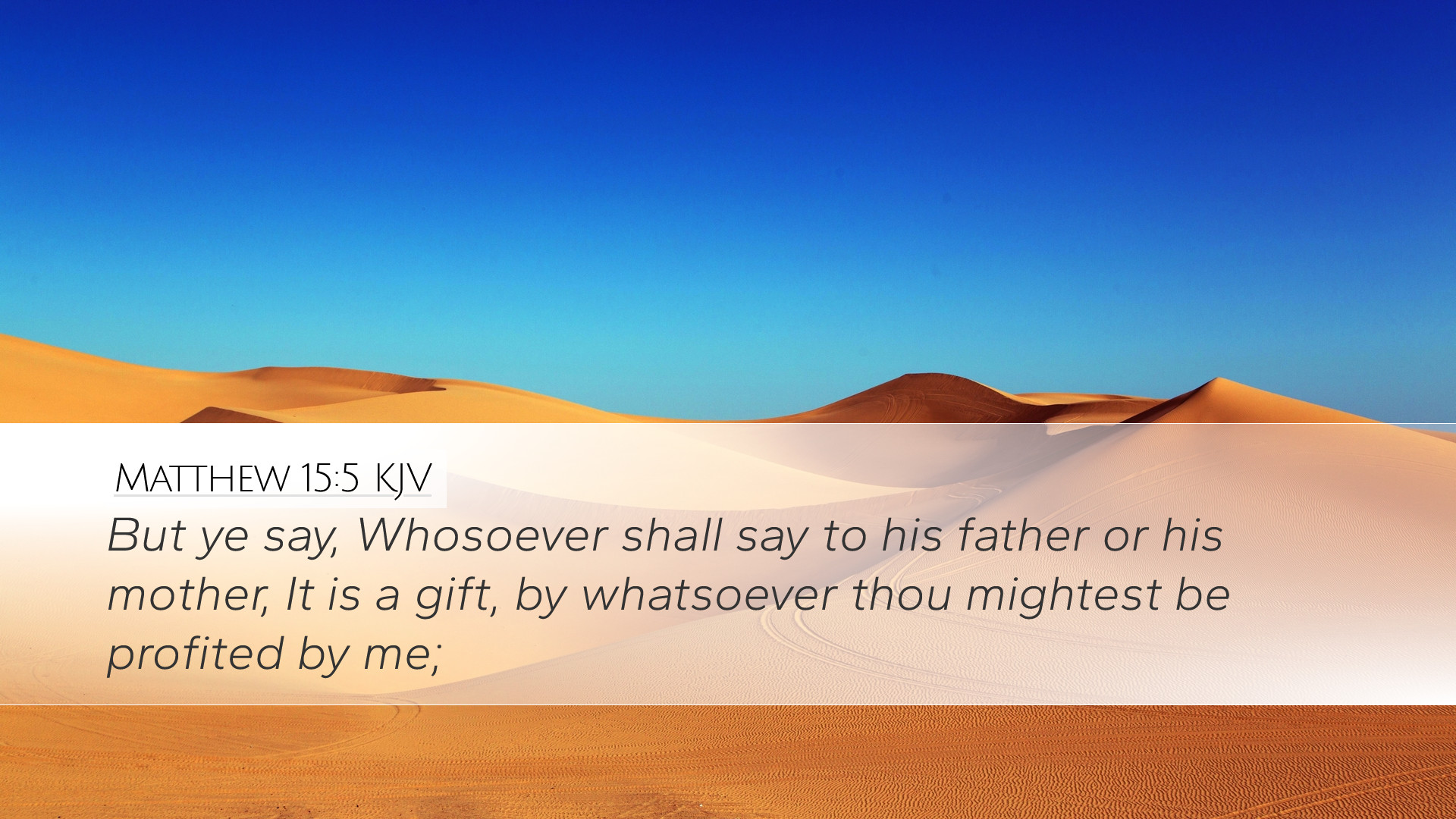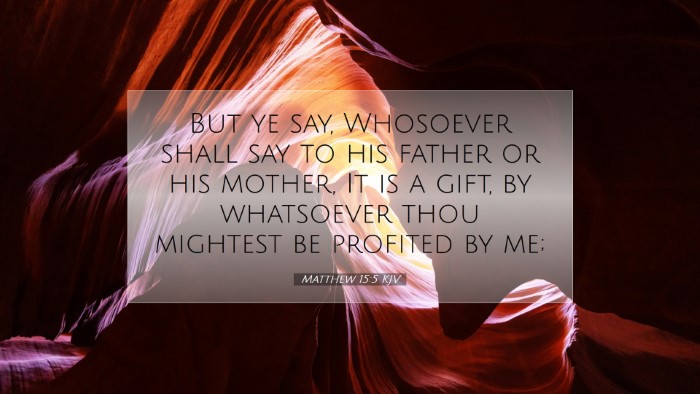Commentary on Matthew 15:5
Verse: "But you say, ‘Whoever says to his father or mother, “Whatever support you might have received from me is a gift devoted to God,” is not to honor his father or mother.’ Thus you nullify the word of God for the sake of your tradition."
Introduction
This passage presents a critical commentary on the conflict between divine commandments and human traditions. Jesus rebukes the Pharisees for their interpretation of the Law and their traditions that contravene the divine commandment to honor parents.
Textual Analysis
Matthew Henry emphasizes that this verse highlights a significant case of hypocrisy where traditions are prioritized over God's commandments. The Pharisees had established a tradition that allowed individuals to declare their resources as “Corban”—a gift dedicated to God—thus relieving them from their duty to support their parents, directly contravening the commandment of honoring one’s parents.
Albert Barnes elaborates that the insistence on such a tradition reflects a warped understanding of devotion to God. It showcases how a person could use religious duty as an excuse to neglect moral responsibilities. The argument that funds devoted to God could be used to justify neglecting family duties reveals a crucial flaw in their religious framework.
Adam Clarke notes that this passage underscores the inconsistency of the Pharisaical practice, asserting that such traditions nullify the authority of God’s Word. He argues that rituals and ceremonies should not eclipse the moral obligations that one has toward family, pointing out that genuine religious devotion must manifest in ethical living and interpersonal relations.
Theological Implications
The theological implications of Matthew 15:5 are profound for Christian ethics and practical theology. The verse forces a confrontation with the reality of traditional practices that can obscure, rather than facilitate, obedience to divine law. This speaks to the current church context where traditions might take precedence over scriptural commands.
Honoring Parents
Matthew Henry stresses the unchanging command to honor one’s father and mother, which links back to the Ten Commandments. Every believer is urged to consider their family obligations seriously, as neglect in this area is tantamount to disobedience to God.
Albert Barnes adds that honoring parents extends beyond mere respect; it involves providing care and support, especially in their old age or times of need. He stresses that faithfulness in family duties is a living out of one's faith, demonstrating how genuine Christian piety should be evident in domestic life.
Tradition vs. Commandment
Adam Clarke poignantly discusses the danger of letting traditions overshadow the core teachings of Scripture. He comments that traditions must always be reversible by Scripture; if they contradict God’s Word, they must be abandoned. This warning serves to remind all Christians of the necessity to constantly evaluate their practices through the lens of Scripture.
Matthew Henry points out that many traditions arise from a good intention but can drift into legalism. He emphasizes the need for discernment in church practices and rituals, advising believers to pursue the heart of the law rather than merely its forms.
Practical Applications
This verse encourages introspection regarding how traditions and practices are applied in today’s church setting. Here are practical insights for pastors and theologians:
-
Evaluate Traditions: Church leaders should regularly assess their traditions and practices to ensure they align with Scripture rather than supersede it. This might require discussions on the origins and purposes of such traditions.
-
Teach Responsibility: Emphasize to the congregation the importance of familial responsibilities as a form of honoring God. Use Matthew 15:5 as a teaching tool to highlight the balance needed between caring for family and devoting oneself to God.
-
Promote Living Faith: Engage the church in meaningful discussions about how faith is expressed in daily life, advocating for a faith that informs ethical decisions, including how they care for loved ones.
-
Emphasize Scriptural Authority: Reinforce the necessity of Scripture as the ultimate authority in all matters of faith and practice, encouraging congregants to prioritizes God’s Word over human traditions.
Conclusion
Matthew 15:5 serves as a warning against the tendency of human beings to prioritize tradition over divine commandments, urging believers to uphold God’s moral directives in all aspects of life, especially in familial relationships. This verse calls for a transformative understanding of worship and duty, emphasizing that true religious devotion is evidenced in how one honors both God and their obligations to family.


